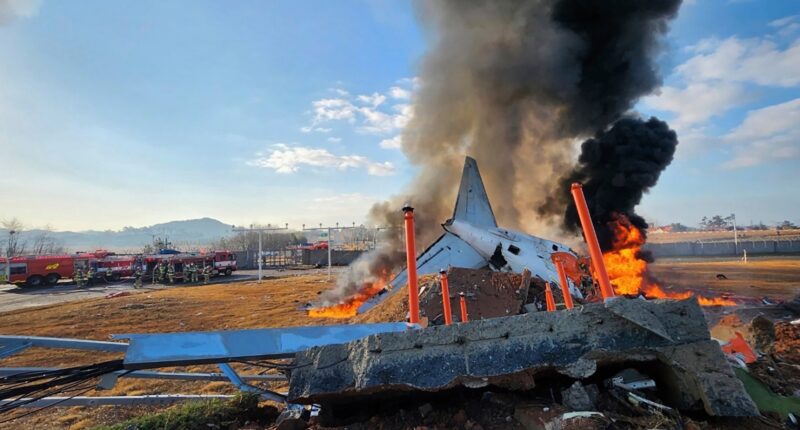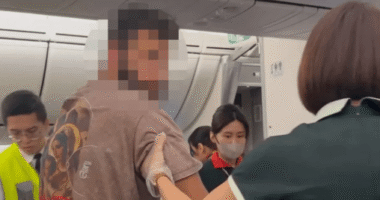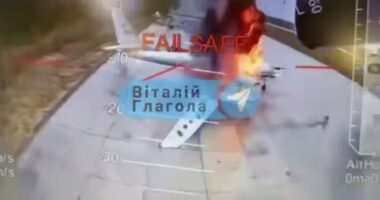Investigators are currently examining the final moments of the tragic Jeju Air plane crash in South Korea that claimed the lives of 179 individuals.
Air crash experts will focus on understanding the events leading up to the Boeing 737-800 crashing into a runway embankment in the early hours of Sunday.

The tragic sequence of events was initiated by a bird strike during the landing approach, followed by a distress call a minute later, and culminated in the aircraft’s emergency landing that resulted in it skidding along the tarmac.
Below is a detailed account of the plane’s journey in the minutes leading up to the crash, which will be thoroughly investigated.
Departure from Bangkok – 4:29 AM
At 4:30 AM Korean time, Jeju Air flight 7C 2216 embarks on its journey from Bangkok to Muan International Airport in southwestern Korea.

The flight is carrying 175 passengers, mostly tourists from package holidays who travelled to Thailand for Christmas.
The flight will take four-and-a-half hours as it skirts the coast of China and is staffed by six crew members.
Plane begins approach to airport – 8.54am
The plane arrives in South Korea on time and begins its descent towards Muan International Airport’s Runway 01 from the south.

Bird strike notification – 8.57am
The plan’s altitude drops 1,000ft at 8.57pm as it comes into land, according to data from FlightRadar24.
The pilot is given a bird strike warning from the air traffic control tower and permission to land in a different area to normal.
Here is a picture show which shows a few minutes later – when the plane appeared to hit a “bird”.

A warning like this is usually issued when a large flock of birds or large birds are spotted near the aircraft.
Footage caught from the ground shows the plane strike a bird with its right engine.
A white plume of what looks like smoke can be seen enter the jet turbine and then get sucked through to the other side.
People on board the plane described a bird getting stuck in the engine and hearing an explosions come from the jet.
Plane climbs again – 8.58am
The plane then briefly climbs again after bottoming out just below 500ft of altitude.
It then stabilises at just above 500ft.
Here is the flight’s final minutes of altitude data.
The blue shows its altitude drop and the yellow spike shows it accelerated hard to even back out

Instead of landing, the plane flies over the top of the airport, Yonhap reports.
According to FlightRadar24’s analysis of the incident, this departure may have been an effort to allow the control tower to visually confirm the deployment of the landing gear.
Mayday call issued – 8.59am
A minute later, the pilot issues a mayday call.

It is not known yet what the pilot said in the call or what reason they gave for calling it.
First landing attempt aborted – 9am
The plane tries to land on Runway 01 but is not able to extend its landing gear.
Final text sent – 9.01am
One passenger sent their final text messages at 9.01am asking the family member whether they should share their “last words”.

With a Hello Kitty profile picture, the text message exchange happened just two minutes before the deadly fireball crash.
The passenger wrote: “A bird got stuck in the wing, so we can’t land.”
The family member asked how long that had been the case.
The passenger then replies with a chilling final message, saying: “Just now, should I say my last words?”
Pilots move to ‘belly landing’ – 9.02am
The pilots then circle around and begin to prepare a ‘belly landing’ without any wheels.

After the fly past the airport they bring the jet about 180 degrees and lower its altitude in preparation for landing.
They will now try and land at Runway 19, in the opposite direction to their first approach.
Jet explodes in second landing – 9.03am
The plane then slams into the ground and skids along the tarmac.

The Boeing’s nose stays in the air as it grinds along on the jets and the bottom of the back of the fuselage.
The aircraft later veers off the runway and collides with a reinforced concrete embankment wall, a safety measure designed to prevent planes from overshooting the runway.
Jeju Air flight 7C 2216 explodes, incinerating much of the fuselage and sending wreckage into the air.

Fireball extinguished – 9.46am
Firefighters quickly rush to the scene but have to battle the blazing wreck being burned by flaming aviation fuel.

Some 32 firetrucks, several helicopters, and 1,500 firefighters were deployed to beat the blaze.
They find bodies have been thrown into the air by the explosion.

Alive crew members found – 9.48am
Inside the tail of the plane, firefighters find two members of the crew who have miraculously survived the massive explosion.

Fire crews abandon search for survivors – 21.07pm
Fire crews abandon the search for survivors after rescue teams scoured for scattered victims.

Tragically, they have not found any more survivors.
Distraught families have been waiting for hours in the airport to find out whether their loved ones have made it.
Instead, they have found 179 dead bodies, including all 175 passengers and four crew.
At 9.07pm they find the final two and finalise the death toll.

The plane has been completely destroyed, with the tail the only recognisable part of the fuselage.
Search workers continue into the night digging through debris, like charred seats.
They also look on the outside of the airport
Both black boxes found – 21.52pm
By 10pm, both parts of the black box have been found.
Soldiers, specialist search teams, and firefighters comb the airport and neighbouring fields for items of the plane that have been thrown into the air.
The investigation into how the disaster happened has already begun.


















